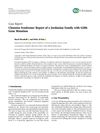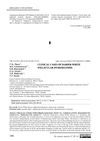 1 citations,
January 2019 in “Elsevier eBooks”
1 citations,
January 2019 in “Elsevier eBooks” Electrospun matrices help regenerate skin and hair follicles using PCL and collagen scaffolds.
 1 citations,
January 2018 in “Side effects of drugs annual”
1 citations,
January 2018 in “Side effects of drugs annual” Diuretics can cause serious side effects and should be used carefully.
 1 citations,
October 2017 in “Elsevier eBooks”
1 citations,
October 2017 in “Elsevier eBooks” Antiandrogens can treat female hormonal conditions, but environmental ones may harm reproductive health.
 1 citations,
October 2013 in “Actas Dermo-Sifiliográficas”
1 citations,
October 2013 in “Actas Dermo-Sifiliográficas” Customized medications made through compounding can be beneficial for various skin conditions but require careful regulation and collaboration between doctors and pharmacists.
 1 citations,
November 2011 in “Dermatologica Sinica”
1 citations,
November 2011 in “Dermatologica Sinica” Women using hair relaxers with alopecia had lower zinc levels, suggesting zinc deficiency might contribute to hair loss.
 1 citations,
January 2009 in “Elsevier eBooks”
1 citations,
January 2009 in “Elsevier eBooks” The document concludes that a deeper understanding of skin aging and photodamage is needed to create better skin treatments.
 1 citations,
January 2005 in “Side effects of drugs annual”
1 citations,
January 2005 in “Side effects of drugs annual” The document concluded that various dermatological treatments have different effectiveness and side effects, with some causing irritation, allergic reactions, or systemic effects.
 1 citations,
March 2004 in “Journal of The European Academy of Dermatology and Venereology”
1 citations,
March 2004 in “Journal of The European Academy of Dermatology and Venereology” Hair loss improved with treatment and successful transplant.
 July 2024 in “Scholars Journal of Medical Case Reports”
July 2024 in “Scholars Journal of Medical Case Reports” Combining low-level laser therapy and exosome therapy promotes hair growth.
 March 2024 in “PLoS medicine”
March 2024 in “PLoS medicine” Physical activity, height, and smoking affect prostate cancer risk.
 March 2024 in “Clinical, cosmetic and investigational dermatology”
March 2024 in “Clinical, cosmetic and investigational dermatology” Upadacitinib may effectively treat alopecia areata without side effects.
 February 2024 in “Pharmaceutical research”
February 2024 in “Pharmaceutical research” Hair follicles affect how well small molecules can pass through the skin, and this varies depending on the molecule's features.
 January 2024 in “International Journal of Research Publication and Reviews”
January 2024 in “International Journal of Research Publication and Reviews” The herbal hair serum with rosemary, hibiscus, and neem is safe and effective for hair care.
 January 2024 in “Burns and trauma”
January 2024 in “Burns and trauma” The skin microbiome helps heal wounds and can be targeted to improve healing.
 December 2023 in “Urogenital tract infection”
December 2023 in “Urogenital tract infection” Seminal bacteria can lower sperm quality in subfertile men.
 December 2023 in “Curēus”
December 2023 in “Curēus” A woman with lupus had rare severe symptoms but improved with treatment.
 November 2023 in “Frontiers in pharmacology”
November 2023 in “Frontiers in pharmacology” Drug repositioning offers hope for new, affordable treatments for a genetic skin disorder called ARCI.

A rare case of a woman having both lichen planus pigmentosus and classic lichen planopilaris at the same time.
 October 2023 in “Case reports in dermatological medicine”
October 2023 in “Case reports in dermatological medicine” A Jordanian family with Clouston syndrome has a common GJB6 gene mutation.
 September 2023 in “Journal of pharmacognosy and phytochemistry”
September 2023 in “Journal of pharmacognosy and phytochemistry” Plumbago zeylanica has valuable medicinal properties but needs sustainable cultivation methods.
 May 2023 in “Sučasna pedìatrìâ. Ukraïna”
May 2023 in “Sučasna pedìatrìâ. Ukraïna” An 11-year-old child with total hair loss may have a genetic autoimmune disease, and the outlook for hair regrowth is not good.

Custom skincare can be made based on genes, fewer cats in Lublin have FeLV/FIV than national average, and studies also looked at small water bodies, river pollution, guppy growth, toxins in biochars, palm oil issues, and pumpkin seed oil for hair strength.
 October 2022 in “Veterinária notícias/Veterinária Notícias”
October 2022 in “Veterinária notícias/Veterinária Notícias” A 5-year-old Akita with a rare skin condition improved significantly after treatment.
 October 2022 in “Medičnì perspektivi”
October 2022 in “Medičnì perspektivi” Darier-White disease causes skin and nail issues, starts around age 20, worsens until 40-50, and has poor treatment options.
 September 2022 in “JAMC. Journal of Ayub Medical College, Abbotabad, Pakistan/Journal of Ayub Medical College”
September 2022 in “JAMC. Journal of Ayub Medical College, Abbotabad, Pakistan/Journal of Ayub Medical College” A boy with a rare skin condition improved quickly after starting zinc supplements.
 April 2021 in “Bioscientia Medicina Journal of Biomedicine and Translational Research”
April 2021 in “Bioscientia Medicina Journal of Biomedicine and Translational Research” Hydroxychloroquine may help COVID-19 patients with lupus.
 April 2021 in “Bioscientia Medicina Journal of Biomedicine and Translational Research”
April 2021 in “Bioscientia Medicina Journal of Biomedicine and Translational Research” Patients with lupus nephritis and COVID-19 can improve with proper treatment.
 March 2021 in “Clin-Alert”
March 2021 in “Clin-Alert” The FDA warned about safety issues with remdesivir and tofacitinib, finasteride is linked to suicidality, potent topical corticosteroids increase osteoporosis risk, henna can cause hemolysis in G6PD deficiency, chemotherapeutic agents can cause adverse reactions, drug interactions are common in cancer patients, ketamine can reduce at-risk drinking, high dose of anticholinergics increases dementia risk in Parkinson's patients, and prenatal exposure to second-generation antipsychotics increases pregnancy complications.
 October 2020 in “Veterinary Dermatology”
October 2020 in “Veterinary Dermatology” New treatments and diagnostic methods for various animal skin conditions showed promising results.
 November 2019 in “Harper's Textbook of Pediatric Dermatology”
November 2019 in “Harper's Textbook of Pediatric Dermatology” The document is a detailed medical reference on skin and genetic disorders.






























